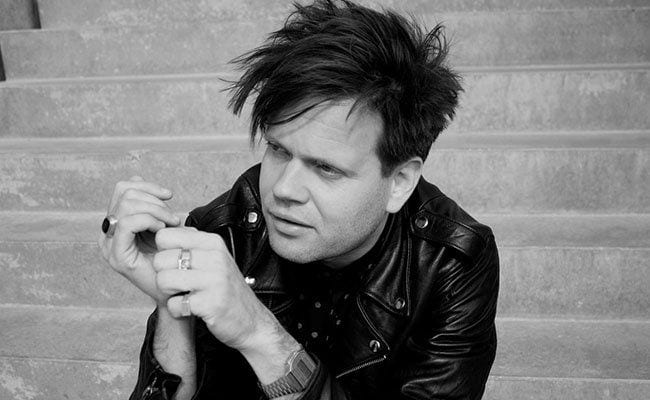
Long rooted in electronic abstraction, Danish DJ and producer Trentemøller has increasing inched his way into the realm of more straight ahead electronic pop music. Through a handful of successful remixes for the likes of Robyn and other like-minded artists and production duty on Savages’ latest release, he has begun to make a name for himself away from the house music scene within which he initially made a name for himself.
It’s not yet a full abandonment, however, as Fixion still features elements of Trentemøller’s heavily electronic musical past in addition to his increasingly pop future. Lead single “River in Me,” featuring Savages’ Jehnny Beth is all post-punk/new wave swagger with decidedly more aggressive production that makes it a clear standout. Both this and “Complicated” benefit a great deal from Beth’s very presence, a well-defined voice that helps anchor Trentemøller’s stylistic wandering in something resembling coherence.
“One Eye Open” aims squarely for electronic pop hit territory, complete with big, pristine production and a gently melodic hook courtesy of guest vocalist and previous Trentemøller collaborator Marie FIsker.
Interspersed within these more traditionally structured electropop tracks are a handful of straight instrumentals that bear an almost uncanny resemblance to the second side of Bowie’s Berlin-era recordings on Low. “Sinus” sounds as though it could have been a library track for some abandoned sci-fi project, while “Phoenicia” incorporates Low’s buzzing, analog synths, pairing them with a Kraftwerk-via-new-wave vibe that builds to a false climax.
“Redefine”, another track featuring Fisker, tones down the straight pop of opener “One Eye Open” in favor of a sparser, more robotically post-punk feel. Like a more fleshed out xx track, “Redefine” relies on Fisker’s hushed vocals against a simple, driving bass line and rudimentary electronic percussion heavy on the twos and fours. It makes for an interesting juxtaposition and Trentemøller’s use of multiple guest vocalists helps to lend each an individualist feel. But more often than not Fixion carries with it the sound of a compilation rather than straight collaboration or unified artistic statement. Not that this is necessarily a bad thing, rather it shows Trentemøller still searching for a well-defined identity within the relatively-new-to-him world of electropop.
More often than not, Trentemøller relies on a post-punk sparseness that functions as a step back from his more lavish recent productions. It’s an interesting distillation of where he has been, combining disparate elements of a nearly 20-year career in hopes of creating a unified sound that fits within the defined Trentemøller sound while also striving to move his music forward.
“My Conviction” devolves from ethereal detachment to grinding electronics in a jarring juxtaposition of styles that never manages to fully come together into a coherent whole. Conversely, “November” evokes the starkness of the penultimate month, again returning to Bowie-esque abstraction and atmosphere generation more so than memorable hooks. The thick, electric guitar drones again call to mind both the xx and, in a nod to the direct post-punk influence on display, New Order. At nearly seven minutes, it’s an elongated sonic exploration that strains to maintain the listener’s attention. It’s seamless transition into “Spinning” extends the track’s feel just that much more, making it something of a “Warszawa” moment for Trentemøller. Only with Fisker’s heavily effected vocals on the latter are the two able to differentiate from one another, its minor-key crawl a direct extension of “November” and its icy remove.
By combining the instrumentally abstract with pure electropop songwriting, Trentemøller has created a rather jarring collection of songs that can never quite settle on who or how it would like to be. Each still retains some of the best elements of the producer’s previous work and is certainly pleasant enough to listen to, but it lacks the stylistic coherence necessary for these types of experiments to truly succeed.
The most clatteringly abrasive track on the album, “Circuits” is all avant garde noise and electronic experimentation. Sounding at once primitive and futuristic, it’s yet another extreme departure from that which precedes it. It’s not until its final, rhythmically propulsive closing minutes that it begins to even remotely resemble anything else on the album. Falling as it does, “Circuits” feels more like a palate cleanser than full-on stylistic reset before embarking on the album’s final two tracks, both of which return to the previously established post-punk/new wave vibe.
In trying to establish a new identity, Trentemøller seems more confused than confident in his declaration of who he wants to be. Yet this stylistic wandering is not without its merits, each representing one of the myriad facets of his musical persona. As soon as he manages to reconcile the more disparate elements into a well-defined whole, it’s likely Trentemøller will find himself one of the leading lights in progressive electropop. Until then, Fixion serves as more of an evolutionary link — a sound experiment — than fully formed statement of intent.

